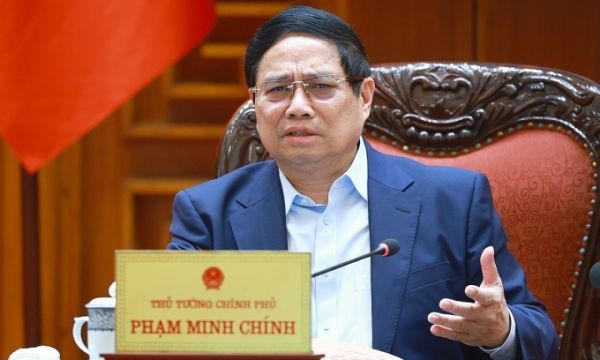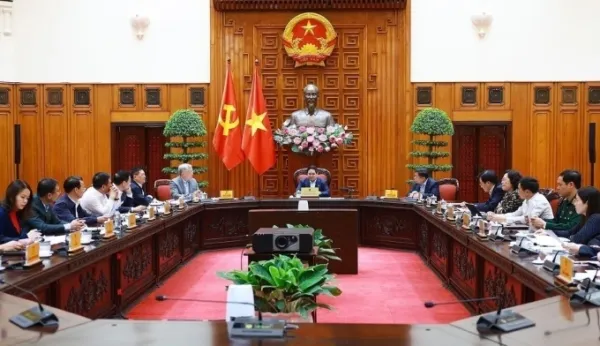
It would be led by Deputy Prime Minister Bui Thanh Son, he said at a meeting on Thursday morning with the heads of the Ministries of Finance, Industry and Trade, Agriculture and Environment, and Science and Technology, the State Bank of Vietnam and various other agencies.
|
Prime Minister Pham Minh Chinh at the meeting on April 3, 2025. Photo by VNA |
The U.S. has said it would impose reciprocal tariffs on imports from more than 180 trading partners, nearly half of whom face a tariff of 10% from April 5. Many of the U.S.’ large trading partners will be subject to higher rates of up to 50% from April 9.
“Vietnam hopes the U.S. will have more appropriate policies given the strong relationship between the two countries,” Chinh said, also pointing to Vietnam’s status as a developing country still recovering from the severe impacts of years of war.
He instructed ministries and other agencies to adopt “proactive and flexible measures in response to any developments” to help Vietnam overcome external shocks and challenges, just as it had during the Covid-19 pandemic.
He tasked Deputy Prime Minister Ho Duc Phoc with supervising government agencies and gathering opinions from businesses, especially major exporters.
He said the current situation shows that trade competition can be intense, complex and unpredictable, but it could also be an opportunity for the economy to restructure and aim for rapid, sustainable development driven by technology and innovation.
“The GDP growth target of at least 8% in 2025 remains unchanged.”
Businesses are concerned that their exports will face intense pressure due to the new tariffs. According to data from the General Department of Customs, Vietnam exported US$119.5 billion worth of goods to and imported $15.1 billion from the U.S. in 2024.
Fifteen export items fetched over $1 billion, with the biggest ones being computers and components ($23.2 billion), machinery and equipment ($22 billion), and textiles ($16.2 billion).
 |
|
A government meeting held on the morning of April 3, 2025, after the U.S. announced reciprocal tariffs on Vietnamese imports. Photo by VNA |
Do Ngoc Hung, head of the Vietnam Trade Office in the U.S., said the new tariff policy would apply to various products, including seafood, plastics, rubber, wood, paper, textiles, footwear, machinery, equipment, components, and electronics.
He said Vietnam should consider cooperative mechanisms and bilateral agreements with the U.S. It should also try to attract more investment from U.S. companies, he said.
U.S. Treasury Secretary Scott Bessent has told Republican senators that the reciprocal tariffs could be reduced if trade partners meet the requirements set by the Trump administration.
Certain products would be exempt from the tariffs, including gold, copper, pharmaceuticals, semiconductors, wood, and some energy and mineral resources unavailable in the U.S.